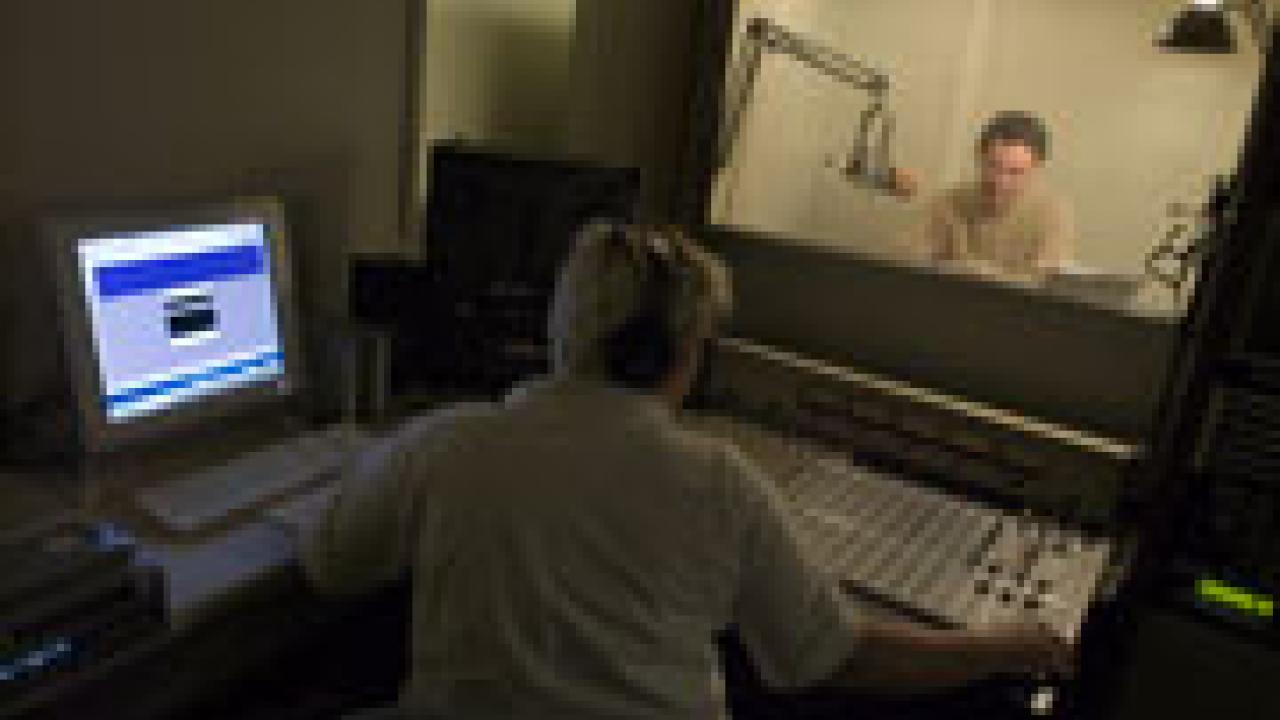UC Davis Chancellor Larry Vanderhoef launched the My Personal Compass essay-writing initiative last September to encourage the campus community to practice their "deep listening" skills. Today, that community can listen even more deeply — by wearing earphones.
In an effort to support Vanderhoef's project, the campus's Mediaworks has begun inviting Compass essayists into its studio to make audio recordings of their essays, recordings that are now being distributed to the greater university community as part of a free podcast series.
"As a participant in the Personal Compass series, you are contributing to an environment on the UC Davis campus where the open exchange of beliefs is encouraged and rewarded," Mediaworks Producer/Director Kris Naegeli said in a recent e-mail to essayists inviting them to participate in a recording session.
Podcasting gets its name from the ubiquitous Apple iPod music and video players. But you do not need an iPod to participate in podcasting or to receive a podcast. Simply put, podcasting is the transmission or distribution over the Internet of audio or video files — such as music, lectures or videos — for listening on personal media devices and computers.
So far, nine essayists have taken Mediaworks up on its podcasting offer.
Kevin Johnson, associate dean of the School of Law, and Perry King, a human resources analyst in the Office of Administration/Human Resources, took their essays into the Mediaworks recording studio last week.
King said he wanted to record his essay, entitled "Reel to Real," for podcast — and hopes to listen to other recorded essays — because, "Hearing them personalizes them. I think I get more of a sense of the author's intentions."
Writing "Reel to Real" — a reminiscence of going to the movies as a youngster with his mother and brother — "was very rewarding. It was valuable for me to try to capture my personal compass, so it was a personal inventory of, 'What do I believe?'" added King, who serves as assistant to Senior Associate Vice Chancellor Dennis Shimek.
Vanderhoef kicked off the My Personal Compass imitative at last year's Fall Convocation, urging campus community members to write about the beliefs that guide their daily lives and to then read and absorb the many perspectives offered by all the others who participate.
"Today the art of deep listening, of hearing and honoring another person's perspective, is perhaps a fading art," Vanderhoef said at the time. "I'm hopeful, though, that we can reclaim that ability and achieve the greater collective understanding necessary to solve our collective challenges as members of this community and as citizens of this world."
Since then, about 80 students, faculty, staff, alumni, elected officials, Davis residents and others have answered the chancellor's call.
Wrye Sententia, a post-doctoral lecturer in English, has used the Compass initiative as a project for her University Writing Program students.
"I very much believe in this campus project as an opportunity for cross-dialogue and mutual understanding," Sententia said, calling the Compass "a perfect tool for inspiring good writing."
Sententia herself has submitted an essay, as have Davis Mayor Ruth Uy Asmundson; Provost Virginia Hinshaw; Paula Lorenzo, immediate past chairwoman of the Rumsey Band of Wintun Indians and chief executive officer of Cache Creek Casino and Resort; Clayton Halliday, the campus's director of architecture; and Arthur Shapiro, professor of evolution and ecology.
As he has done in the past, Vanderhoef has invited two campus community members to read their essays at the chancellor's upcoming quarterly brown bag on April 13 (12-1 p.m., in MU II of the Memorial Union). They are Faith Maul, management analyst and assistant to Police Chief Annette Spicuzza, and Harjot Singh Maan, a junior biochemistry major.
To read Maul's and Maan's essays and for more information on the My Personal Compass program and a link to the podcasts, please go to http://mypersonalcompass.ucdavis.edu.
If any essayist would like to record his or her essay for podcasting, contact Assistant Chancellor Maril Stratton, (530) 752-9566, or mrstratton@ucdavis.edu.
Media Resources
Mitchel Benson, (530) 752-9844, mdbenson@ucdavis.edu
